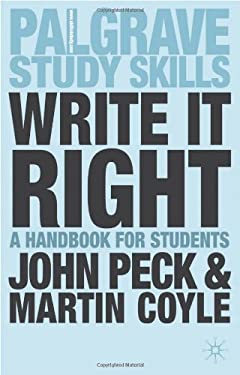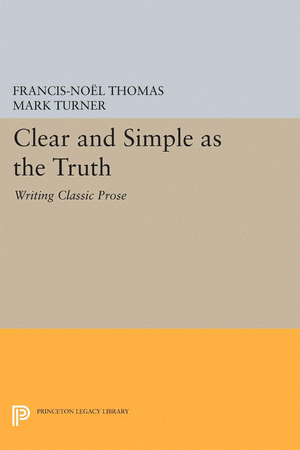Student Guides
Ideal for English Literature students is this one, generously placed in the public domain,by Hazel Hutchison (Royal Holloway College, University of London), Guide to Good Writing

For a book-length guide for students, I recommend Peck and Coyle's Write it Right
Books on Style
The resources above are aimed at the student market. Other books deal with the wider question of clear style, which is applicable to various academic and professional fields.

Strunk and White's Elements of Style is a classic older book. Today it perhaps seems a little dogmatic in its precepts, and it does not go far into he mechanics of how to be clear. But it is constantly engaging, blessedly short and inspires us to get rid of some of the clutter in our prose. A few pounds very well spent. The original 1918 text by Strunk is accessible here.
 The best thing I have found on writing clearly is Style by Joseph Williams. His wonderful guide actually provides a course of exercises to help you get better (Strunk and White generally tell you get better). There are a rather confusing variety of editions of this book, which has gone through various publishers, but you won't go wrong with these two:
The best thing I have found on writing clearly is Style by Joseph Williams. His wonderful guide actually provides a course of exercises to help you get better (Strunk and White generally tell you get better). There are a rather confusing variety of editions of this book, which has gone through various publishers, but you won't go wrong with these two:Style: Ten Lessons in Clarity and Grace contains the principles, with exercises
Style: The Basics of Clarity and Grace gives you the essence
Williams is commending a certain style, which one may call 'classic', characterised by the virtues of concision, clarity and balance. This is explored rather beautifully, with plenty of examples, in a book by Francis-Noël Thomas and Mark Turner, Clear and Simple as the Truth: Writing Classic Prose

My Stuff
That's more than enough to choose from. But just to round things off, last and least, here's a little handout of my own, largely drawn from Williams, with some practical experience thrown in:
And below is a brief summary of my own commandments. Looking at it again it seems rather hectoring, telling not showing, but maybe it's of some service as a memo. Good luck to all those coursework scribes out there.
Writing Clearly: Some Guidelines
1. Read. If you want to write well, you have to read well.
2. Find a model.
If there is an author
you find clear and compelling, try imitating his / her style.
3. Be honest.
Don’t pretend to have something to say when you don’t. Don’t try to make your
point sound bigger than it really is.
Show off by being precise, not by being fancy.
Shakespeare uses alliteration which adds to the effect and helps the
poem flow.
A completely empty sentence.
4. Choose the right subject.
Sentences should start with a precise, simple subject.
One of the aspects of Wordsworth’s poetry which we see at once in these
lines is his love of nature. Subject
is long and vague
Wordsworth’s love of nature is immediately apparent in these lines.
Subject is more accurate.
An erotic atmosphere is built up by the poet by means of imagery of
sensual pleasure.
Uncertainty over subject has led
to awkward construction
Images of sensual pleasure create an erotic atmosphere.
Clear subject leads to a cleaner
sentence.
5. Find a verb which
expresses the idea. Don’t rely on is
all the time. Write a list of verbs and put it where you can see it:
Some things that writing can do: explore, illustrate, describe, suggest, echo, allude ….
And things that people (the subject of writing) do: rejoice, mourn, ask, regret, deny …
6. End strongly.
The important point should come at the end of the sentence.
In Wordsworth’s philosophy, our emotional
responses to Nature form our moral character.
Our attitude towards the Duke varies over
the course of the play.
Over the course of the play, our attitude towards
the Duke varies.
Don’t tail off:
Our attitude to the Duke varies over the course of the play, and this
keeps us interested and involved.
7. Open paragraphs
with a topic sentence.
Although he is the villain of the play,
Edmund has some admirable traits.
Openings of
paragraphs can also work as a chain:
These early preoccupations return in the
later poetry.
Macbeth is not the only character to display
his conscience.
8. Use the main body
of the paragraph to develop the theme. For example, support it with
quotations, add a detail.
9. End paragraphs
strongly. Keep a special ‘hit’ for
the end of an essay.
10. ‘Tell the story’
from a consistent point of view.
Compare:
The girl in ‘We Are
Seven’ does not understand death. The
speaker keeps asking her why she counts the children in the family as
seven, but she does not understand what he means. The reader notices the man’s incomprehension as much as the girl’s.
Wordsworth emphasises her simplicity
by using simple language and verse forms. Innocence
and the natural wisdom of children are important ideas in the Lyrical
Ballads. The romantic movement was
particularly influenced by the ideas of Rousseau concerning children, and several later poems also deal with the
subject.
We Are Seven presents two
kinds of incomprehension: there is the girl, who does not understand death, and
the speaker, who does not understand the girl. This subject is matched by the poetic treatment: the poem’s simple language and
unsophisticated verse forms suit the ideas of innocence and the natural
wisdom of children. In this choice and handling of material, the poem is an important example of the
romantic movement’s preoccupation with childhood. It points back to the influential theories of Rousseau, and forward
to much later work on the subject.